I Wanted to Create a Mirror: A Guest Post by M.T. Khan
After dazzling young readers with her debut, Nura and the Immortal Palace, our current Monthly Pick for young readers, M.T. Khan was torn between writing a sequel or introducing the world to brand-new characters. Read on to discover the inspiration behind Amir and the Jinn Princess and their connection to Nura in Khan’s exclusive guest post.
Amir and the Jinn Princess
Amir and the Jinn Princess
By M. T. Khan
In Stock Online
Hardcover $16.99
A young human boy and a magical jinn princess team up to make their dreams come true in this terrific adventure story that nods to Pakistani folklore.
A young human boy and a magical jinn princess team up to make their dreams come true in this terrific adventure story that nods to Pakistani folklore.
Amir and the Jinn Princess came to me after an intense wrestle. I was initially prescribed to do a direct sequel to my debut novel, NURA AND THE IMMORTAL PALACE. The acquiring editor convinced me it was possible—Nura and Faisal are great characters, readers will want to see more of them—and while I selfishly do think all of that is true, I knew that their story was complete. To plunge them into another ordeal would only rip open old wounds that had healed beautifully.
So after I turned in some dumpster drafts of a NURA sequel that will never see the light of day, my editors graciously gave me the chance to write whatever I wished in the middlegrade space. It was freeing, but reversely, quite daunting. With no constraints to wrangle my boundless imagination, I could’ve set myself up for an exhausting game of cat and mouse, with me chasing a story that might never wish to be written.
I gave myself boundaries. With a blooming audience who have shown utmost enthusiasm for my books featuring brown kids, set in Pakistan, and with a cast of trickster jinn, I thought the perfect way to honor my readers and my own vision was to write a companion novel—set in the same universe but with a fresh cast of characters.
I’ve always loved mirrors. The idea that there is a subject, and then its reflection. But sometimes reflections are wonky, blurred, disturbing, or show us sides we never expected to see. The qareens in Nura are exactly that, our darker sides, the subconscious desires that hum beneath our skin. With my companion novel, I wanted to create a mirror to Nura’s story itself. Where Nura is a poor kid, Amir is a golden spoon. Where Nura works a dangerous job to help make a living for her family, Amir is disinterested in becoming the heir to his family’s business. Where Nura answers the question of child labour and cyclical poverty, Amir revisits that question from the other end of the horizon—what responsibility do the rich have to the poor? They are two sides of the same coin.
This story is brought to life by an island interconnected through waterways, with a giant ancient ship pumping life to its surrounding towns and cities. We get familiar with the royals of the Kagra Kingdom, as they compete against each other for the throne. A certain princess however, gleans the help of our protagonist Amir, promising to find his missing mother in return. The story shimmers with secrets, wondrous magic, and vivid settings that colour the pages. I wanted to honor what any child with siblings can attest to—the rivalry, the love, the forgiveness. And beyond all that, I wanted to write a wish-fulfilling adventure where rich kids finally realized their privilege and thought—how can I use this to help others?

